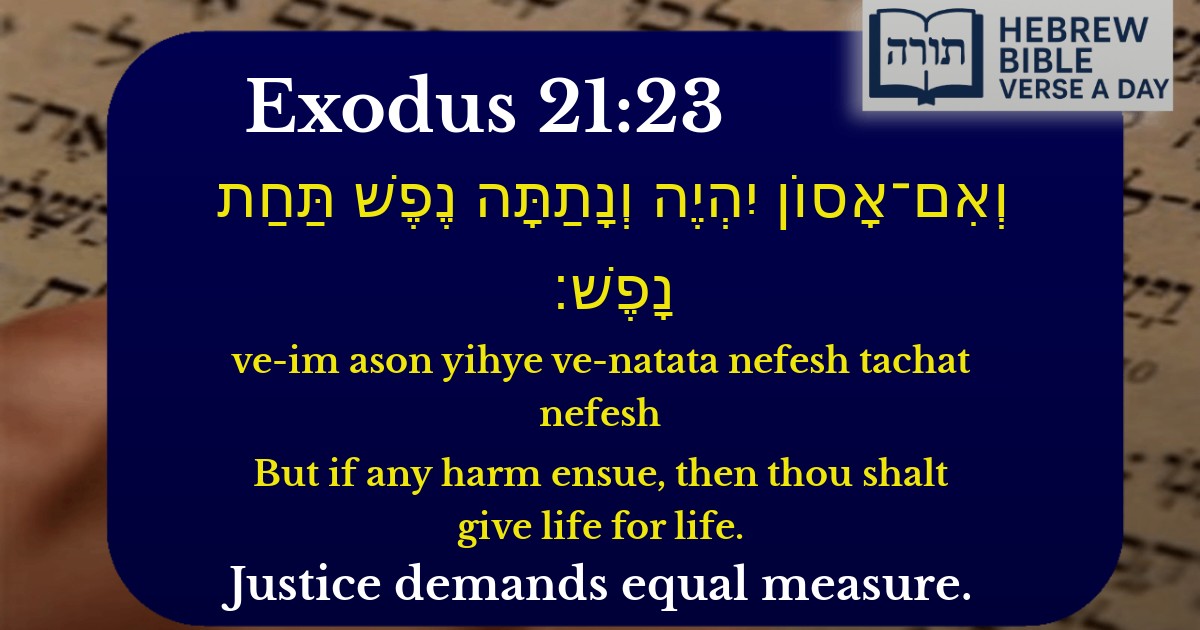Frequently Asked Questions
Q: What does 'life for life' mean in Exodus 21:23?
A: The phrase 'life for life' in Exodus 21:23 refers to the principle of proportionate justice in Jewish law. According to Rashi and the Talmud (Bava Kamma 83b), this does not mean literal retaliation ('an eye for an eye'), but rather monetary compensation for damages caused. The Torah teaches that courts must assess the value of the injury and require the responsible party to pay fair restitution.
Q: Why is Exodus 21:23 important in Jewish law?
A: Exodus 21:23 is a foundational verse in Jewish civil law (Halacha) regarding personal injury cases. The Rambam (Hilchot Chovel u'Mazik) explains that this verse establishes the obligation to compensate for damages, whether physical, financial, or emotional. It emphasizes the sanctity of human life and the responsibility we have toward others.
Q: How does Exodus 21:23 apply today?
A: While we no longer have a Sanhedrin (Jewish high court) to adjudicate these cases, the principle of 'life for life' still applies in Jewish law through financial compensation. Today, Beit Din (rabbinical courts) use this verse as the basis for ruling on personal injury cases, requiring proper restitution for any harm caused, following the guidelines set by the Talmud and later halachic authorities.
Q: Does 'life for life' mean capital punishment in Exodus 21:23?
A: No, traditional Jewish interpretation (as explained in the Talmud, Sanhedrin 79a) clarifies that 'life for life' in this context refers to monetary compensation, not capital punishment. The verse appears in a section discussing civil damages for injuries during a fight, not intentional murder. Only a proper Jewish court could administer capital punishment under very strict conditions that were almost never met.
Q: What lesson can we learn from Exodus 21:23?
A: This verse teaches us the profound value Judaism places on human life and personal responsibility. The Midrash (Mechilta) explains that causing harm to another person is considered a serious offense against G-d's creation. The requirement for fair compensation reminds us to be careful in our actions and to take responsibility when we wrong others, whether physically, emotionally, or financially.


Context in the Torah
The verse (Exodus 21:23) appears in the context of the laws concerning damages and injuries, specifically addressing a case where two men are fighting and a pregnant woman is accidentally harmed, leading to a miscarriage or further injury. The principle of "life for life" establishes the legal framework for restitution in cases of wrongful death or severe injury.
Literal Interpretation (Peshat)
Rashi explains that the phrase "נֶפֶשׁ תַּחַת נָפֶשׁ" (life for life) refers to monetary compensation rather than literal retaliation. This aligns with the Torah's broader legal system, which generally requires financial restitution for damages (as seen in Exodus 21:18-19). The Talmud (Bava Kamma 83b) elaborates that the verse mandates payment for the value of the life lost, not capital punishment, unless the act was intentional murder.
Legal Principles (Halacha)
Rambam (Mishneh Torah, Hilchot Chovel u'Mazik 2:6-7) codifies this ruling, stating that one who causes the death of another unintentionally must pay monetary compensation to the victim's family. The principle of "תַּחַת" (in place of) indicates substitution—payment in lieu of the life taken, not actual retaliation.
Moral and Ethical Dimensions (Derash)
The Midrash (Mechilta d'Rabbi Yishmael) emphasizes the gravity of taking a life, even unintentionally, and underscores the sanctity of human life. The requirement to provide restitution serves as both a legal and moral deterrent, reinforcing the idea that every life is invaluable and must be accounted for.
Key Takeaways